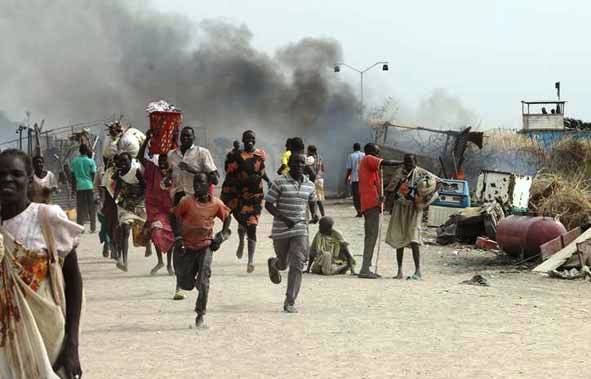South Sudan IDPs accuse Rwandan troops of complicity in Malakal attack

March 3, 2016 (JUBA) – South Sudanese community leaders and youth representatives of members of the internally displaced persons (IDPs) in the Upper Nile state’s capital, Malakal, have accused Rwandan peacekeepers deployed in Malakal of complicity in the 17 February attacks on the IDPs inside the United Nations camp which left over 40 people dead, over 90 wounded with many more still missing.
The leaders from the Shilluk and Nuer ethnic groups in their joint letter addressed to the United Nations deputy secretary general for humanitarian affairs also asserted that their safety would not be guaranteed if it is left in the hands of the same troops from the east African country.
“We request that we will not be protected by the Rwandan force protection unit and Rwandan battalion as they already failed to carry out their duties in preventing SPLA [Sudan People’s Liberation Army] from attacking us; instead they have cooperated with the SPLA in our murdering,” the letter signed by six community leaders read in part.
“ If the Rwandan Force Protection and Rwandan Battalion are not changed, we will not feel safe to go back to our protection of civilian camps and therefore, we are asking UNMISS (United Nations Mission in South Sudan) to address this matter of urgency before [returning] back to those places,” the letter added.
The leaders of the camp, according to the letter, dated 20 February, obtained by Sudan Tribune, recalled that lots of lives could not have been lost had the Rwandan troops not prevented members of the IDPs from escaping from Charlie Gate.
The charged that many of them were shot because the Rwandan troops blocked until they later on had to break the fence at another site controlled by Indian troops. Rwandan and Indian troops’ contingents are the ones in charge of the Malakal IDPs camp.
“As a result of this incident, so far, 41 deaths were counted from both Nuer and Chollo (Shilluk) communities of which we have their detailed records in term of sex, age as well as what tool killed the person, for example, gunshot or beaten to death…”.
“However majority of the casualties are caused by direct gunshot and are vulnerable groups, that is women and children while the number of missing is over 40 individuals among them women and children and their whereabouts is not known,” the letter added.
The letter called for an independent investigation into the matter and charged that the attack was carried out by the government soldiers with the view of wanting to forcefully remove from the camps members of Shilluk and Nuer ethnic groups who have continued to remain in the area after President Salva Kiir issued an order unilaterally dividing up the country into 28 states.
The new state of Eastern Upper Nile, given to Dinka of Padang community, has taken the contested Malakal capital with it, according to the new arrangement, despite being historically claimed by the Shilluk community.
The IDPs also condemned violence on all sides and the “persistence of impunity, as well as of the inflammatory statements made by local leaders, including Eastern Nile governor, Chol Thon.”
The letter was signed by Peter Deng Dhikwan, representative of Shilluk (Chollo) community elders in the camp, David Dak Koljok, Chollo (Shilluk) youth representative and Michael Gwang, Chollo (Shilluk) community representative.
Other leaders include Simon Kun William, Nuer community representative, Dak Thomas Tanyyier, Nuer youth representative and Thomas Bidding, Nuer community representative.
(ST)
